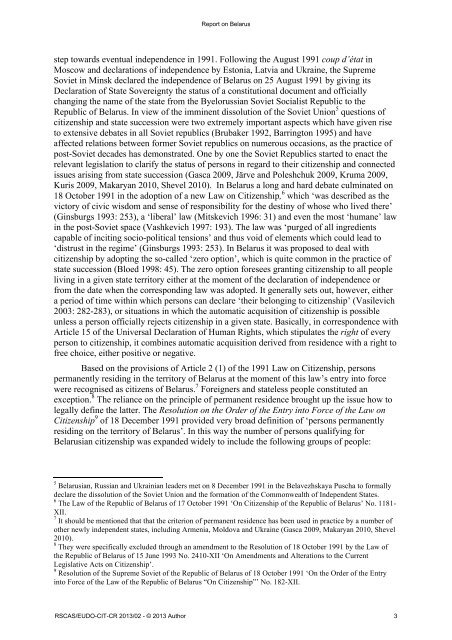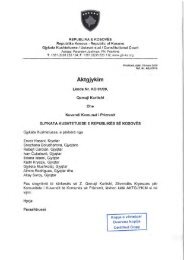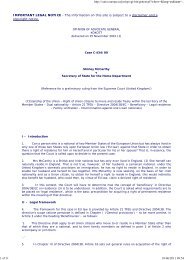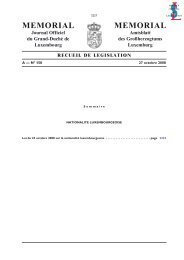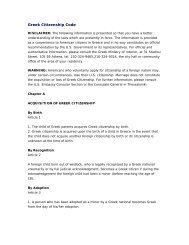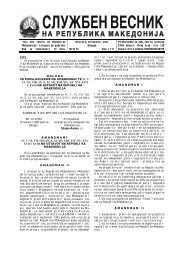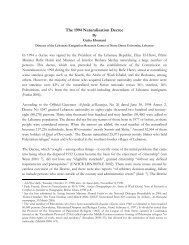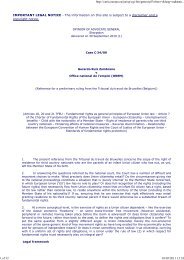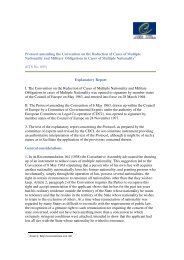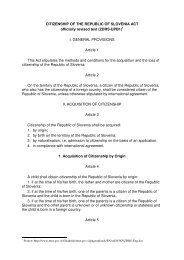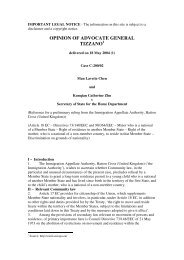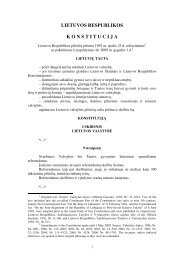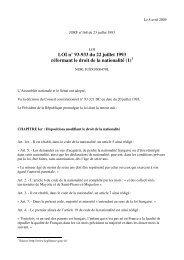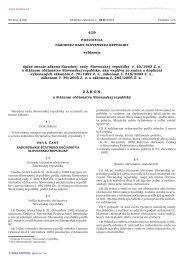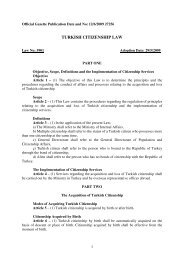Belarus updated November 2012 - EUDO Citizenship
Belarus updated November 2012 - EUDO Citizenship
Belarus updated November 2012 - EUDO Citizenship
You also want an ePaper? Increase the reach of your titles
YUMPU automatically turns print PDFs into web optimized ePapers that Google loves.
step towards eventual independence in 1991. Following the August 1991 coup d’état inMoscow and declarations of independence by Estonia, Latvia and Ukraine, the SupremeSoviet in Minsk declared the independence of <strong>Belarus</strong> on 25 August 1991 by giving itsDeclaration of State Sovereignty the status of a constitutional document and officiallychanging the name of the state from the Byelorussian Soviet Socialist Republic to theRepublic of <strong>Belarus</strong>. In view of the imminent dissolution of the Soviet Union 5 questions ofcitizenship and state succession were two extremely important aspects which have given riseto extensive debates in all Soviet republics (Brubaker 1992, Barrington 1995) and haveaffected relations between former Soviet republics on numerous occasions, as the practice ofpost-Soviet decades has demonstrated. One by one the Soviet Republics started to enact therelevant legislation to clarify the status of persons in regard to their citizenship and connectedissues arising from state succession (Gasca 2009, Järve and Poleshchuk 2009, Kruma 2009,Kuris 2009, Makaryan 2010, Shevel 2010). In <strong>Belarus</strong> a long and hard debate culminated on18 October 1991 in the adoption of a new Law on <strong>Citizenship</strong>, 6 which ‘was described as thevictory of civic wisdom and sense of responsibility for the destiny of whose who lived there’(Ginsburgs 1993: 253), a ‘liberal’ law (Mitskevich 1996: 31) and even the most ‘humane’ lawin the post-Soviet space (Vashkevich 1997: 193). The law was ‘purged of all ingredientscapable of inciting socio-political tensions’ and thus void of elements which could lead to‘distrust in the regime’ (Ginsburgs 1993: 253). In <strong>Belarus</strong> it was proposed to deal withcitizenship by adopting the so-called ‘zero option’, which is quite common in the practice ofstate succession (Bloed 1998: 45). The zero option foresees granting citizenship to all peopleliving in a given state territory either at the moment of the declaration of independence orfrom the date when the corresponding law was adopted. It generally sets out, however, eithera period of time within which persons can declare ‘their belonging to citizenship’ (Vasilevich2003: 282-283), or situations in which the automatic acquisition of citizenship is possibleunless a person officially rejects citizenship in a given state. Basically, in correspondence withArticle 15 of the Universal Declaration of Human Rights, which stipulates the right of everyperson to citizenship, it combines automatic acquisition derived from residence with a right tofree choice, either positive or negative.Based on the provisions of Article 2 (1) of the 1991 Law on <strong>Citizenship</strong>, personspermanently residing in the territory of <strong>Belarus</strong> at the moment of this law’s entry into forcewere recognised as citizens of <strong>Belarus</strong>. 7 Foreigners and stateless people constituted anexception. 8 The reliance on the principle of permanent residence brought up the issue how tolegally define the latter. The Resolution on the Order of the Entry into Force of the Law on<strong>Citizenship</strong> 9 of 18 December 1991 provided very broad definition of ‘persons permanentlyresiding on the territory of <strong>Belarus</strong>’. In this way the number of persons qualifying for<strong>Belarus</strong>ian citizenship was expanded widely to include the following groups of people:!!!!!!!!!!!!!!!!!!!!!!!!!!!!!!!!!!!!!!!!!!!!!!!!!!!!!!!!!!!!5 <strong>Belarus</strong>ian, Russian and Ukrainian leaders met on 8 December 1991 in the Belavezhskaya Puscha to formallydeclare the dissolution of the Soviet Union and the formation of the Commonwealth of Independent States.6 The Law of the Republic of <strong>Belarus</strong> of 17 October 1991 ‘On <strong>Citizenship</strong> of the Republic of <strong>Belarus</strong>’ No. 1181-XII.7 It should be mentioned that that the criterion of permanent residence has been used in practice by a number ofother newly independent states, including Armenia, Moldova and Ukraine (Gasca 2009, Makaryan 2010, Shevel2010).8 They were specifically excluded through an amendment to the Resolution of 18 October 1991 by the Law ofthe Republic of <strong>Belarus</strong> of 15 June 1993 No. 2410-XII ‘On Amendments and Alterations to the CurrentLegislative Acts on <strong>Citizenship</strong>’.9 Resolution of the Supreme Soviet of the Republic of <strong>Belarus</strong> of 18 October 1991 ‘On the Order of the Entryinto Force of the Law of the Republic of <strong>Belarus</strong> “On <strong>Citizenship</strong>”’ No. 182-XII.


